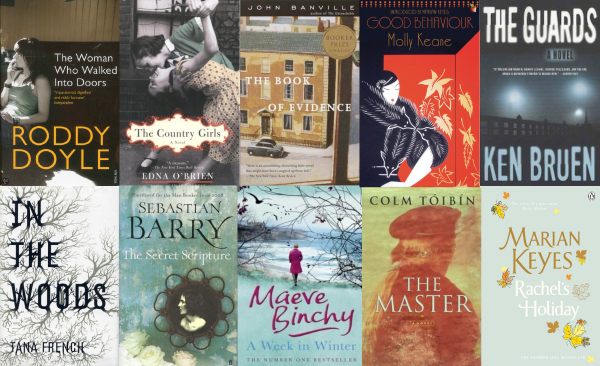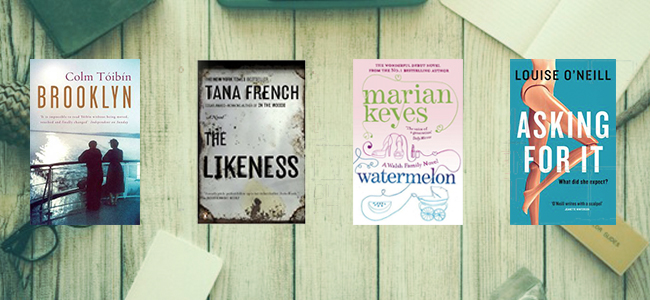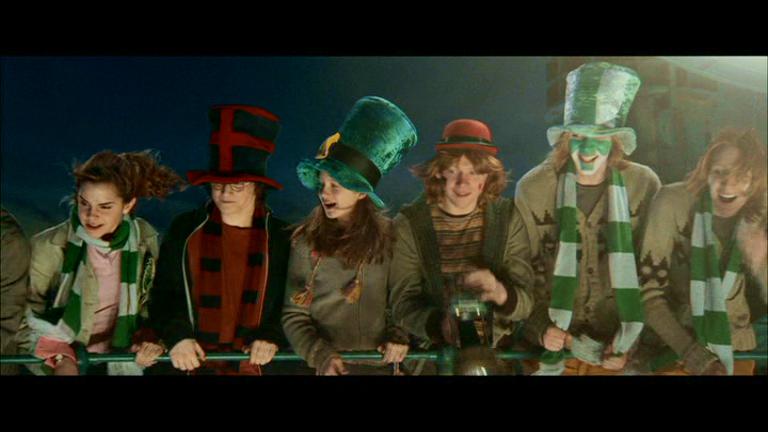Ten Irish Authors to Read at Least Once (Who Aren’t James Joyce)
Where there’s a list of top Irish authors, there’s usually James Joyce. Which isn’t to say the Ulysses scribe isn’t praiseworthy, just that Ireland has produced lots of other literary talent, too. As we celebrate Irish heritage in March, it’s time to offer the spotlight to some of the country’s other fine novelists. Here are some noteworthy ones to start you off.
Roddy Doyle: If you like dialogue-heavy novels, you can’t go wrong with Roddy Doyle. His novels are primarily set in working class Ireland, but span a variety of themes. He’s equally adept at humor, as in The Commitments, in which a group of unemployed Dubliners start a soul band, as he is heartbreaking drama, as he demonstrates in The Woman Who Walked Into Doors, in which a woman struggles with a drinking problem while married to an abusive husband. His most recent adult novels is a colorful trilogy known as The Last Roundup Series. Set in various Irish and American locations, it covers broad range of themes, from the IRA to the mafia to the Hollywood film industry.
Edna O’Brien: You know a writer is doing something groundbreaking and different when their work is banned. O’Brien’s first novel, The Country Girls, was published in 1960 and has such a distinction. A coming of age story about two girls that did not shy away from sexual matters, it was not only a target of the Irish censorship board, but evn publicly burned at the pulpit. That didn’t stop this author from exploring the internal lives of women through additional novels, plays, screenplays, and short stories. She left Ireland, but her work continued to reflect the different facets of her complex relationship with her native land.
John Banville: He’s been compared to Proust and Nabakov and has won numerous awards for his novels, including the Booker Prize for The Book of Evidence, about a man recounting his life story as he confesses to a murder. His books delve into such worlds as science (The Revolutions Trilogy) and art (the Frames trilogy) and his prose garners high praise from critics and fellow writers. Like Nabakov, Banville is known for wit and dark humor, as well as his lyrical command of the language. And if you’re looking for something a bit less highbrow, he also writes crime fiction under the name Benjamin Black.
Molly Keane (“M.J. Farrell”): It could be said that Keane had two entirely separate writing identities. She was known as a leading playwright in the 1930’s when she wrote under the pseudonym M.J. Farrell, which she also used to pen eleven of her novels. After a twenty-year hiatus from her craft (rumored to be caused by a negative review), she returned to writing and produced what is considered to be some of her finest work. She’s known best Good Behavior, a tale of a crumbling aristocratic Anglo-Irish family, which was published in 1981 and shortlisted for the Booker Prize.
Ken Bruen: If you like your fiction a bit more hard-boiled or with a noir bent, you can’t go wrong with Bruen. The author of over thirty novels, noted for their sharp dialogue and black humor, he is particularly acclaimed for his Jack Taylor series, which begins with The Guards, about the misadventures of a former-police-officer-turned-private investigator. This isn’t mere crime fiction, though. Through his work, Bruen explores the social, political, and economic changes of contemporary Ireland.

Tana French: While she was born in America and lived in several countries growing up, she has spent the last 25 in Dublin, where she trained as an actress before turning to writing. Her debut In the Woods, a detective novel/psychological thriller set in contemporary Ireland, won numerous awards and kicked off what would become the Dublin Murder Squad series. If you enjoy literary mysteries that are character-driven and full of glittering prose, look no further.
Sebastian Barry: He’s been called Ireland’s greatest living writer, has won countless awards, and is another multi-talented scribe, with plays and poetry to his credit in addition to fiction. One of his most acclaimed books, The Secret Scripture, about the mysterious life of a 100-year-old mental patient, was inspired by a tale he heard about an old family relative. Much of his other work is also largely inspired by his own family history, resulting in an array of novels that paint a portrait of 20th century Ireland.
Maeve Binchy: A more recognizable name, for sure, but deserving of a mention for being one of Ireland’s most cherished writers. An author and journalist, she was known for her warmth and humor, which carried over into her work, and she was greatly mourned when she died just a few years ago. Binchy’s heroines may not always get a happy ending, but they are portrayed as vibrant characters that survive and persevere. Her sprawling books, whether set in a village or Dublin or a fictional Irish setting, whether they deal with family, betrayal, friendship or romance, always contain large quantities of love, community spirit and compassion.
Colm Tóibín: As many others on this list, Tóibín doesn’t limit himself to fiction; he’s also an essayist, poet, playwright, journalist and critic. His body of work is expansive and widely acclaimed and while his prose style is spare, it is emotionally complex. A common theme in his fiction is Irish society, creativity, and people in search of a home, whether by way of being physically displaced or struggling with personal identity (often both). He is a maestro at creating rich, multifaceted inner lives for his characters and, being openly gay, does not shy away from exploring homosexual identity in his work.
Marian Keyes: At first glance, novelist and essayist Keyes’ work could mostly be classified as comedic women’s literature, sometimes even dismissed as “chick lit.” Once you scratch the surface and look beyond the candy-colored book covers, darker themes lurk: alcoholism, mental illness, domestic violence, and drug addiction to name a few. Keyes may sometimes draw from her own experiences with substance abuse and depression in her work, but she’s deft at treating heavy subjects with a light hand, with enough humor always present to balance out the tragedy. The result is a series of compulsively readable novels, full of beautifully-flawed heroines dealing with the obstacles life has dealt them, each peppered with equal doses of heartbreak and hilarity.

Margarita Montimore
Margarita writes upmarket fiction and is represented by Victoria Skurnick at Levine Greenberg Rostan. She also transcribes and pokes fun at her old journal entries at The Diary Project. When not wrangling her ever-growing book and movie collections or feeding squirrels and chipmunks, she dreams of the day time machines are built so that she can return to the 1980s. Follow her on Twitter at @damiella.



